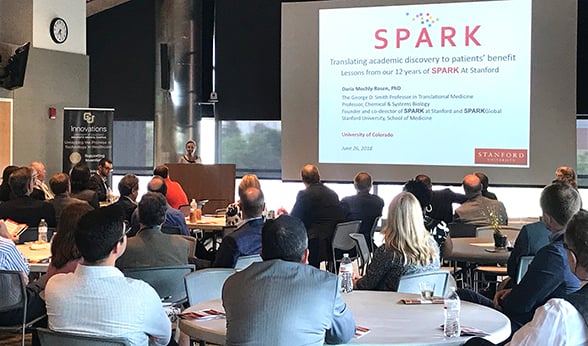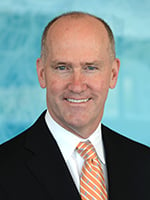Aha! Eureka! The sounds of scientific breakthroughs echo across the University of Colorado Anschutz Medical Campus. While academia produces revolutionary ideas, it can be a complicated and difficult process to translate them to commercial products.
Fortunately, SPARK Colorado is here to help. The SPARK program works to bridge the world of academia with product development and business.
Bridging academia and industry
SPARK, which originated at Stanford University, came to CU Anschutz in 2018. It is aptly part of CU Innovations, which provides support in the translation of academic discoveries to patient benefit.
 A SPARK session taking place in Krugman Conference Hall at CU Anschutz.
A SPARK session taking place in Krugman Conference Hall at CU Anschutz.
“Our faculty has the academic foundations to be wildly creative and successful,” said Kimberly Muller, managing director of CU Innovations. “But, moving early scientific discoveries from bench to bedside is quite complicated, and it requires various sets of expertise and resources. CU Innovations is working to bring those resources to the campus to surround our faculty, with the ultimate goal of getting these drugs and devices to patients as fast as possible.”
Substantial funding and education in innovation
The SPARK program accepts a cohort each year. Max Mitchell, MD, professor of surgery in the University of Colorado School of Medicine, was awarded a SPARK Fellowship grant in June 2018.
Mitchell was working on developing a medical device to help quickly implant a cardiovascular device when he learned about SPARK.
“SPARK merges a wide variety of clinicians and basic scientists with differing projects,” he said. “The program leverages the diverse experience and skill set of the fellows, promoting learning from others.”
The program is founded upon three pillars: industry mentorship, funding and training.
“The industry mentorship is really the most important piece,” said Cigdem Benam, SPARK co-director who is in charge of educational initiatives of CU Innovations. “The unique relationship built from the SPARK program helps researchers to foresee the risks in product development in early stages and work on mitigating them. It pushes them to define the end product and walk backwards in planning each step of the process with the crucial input from industry mentors.”
 Max Mitchell, MD
Max Mitchell, MD
Beyond the mentorship, SPARK offers $100,000 in funding and educational training in innovation, product and venture development. It also attracts business leaders from all project types to campus, including venture capitalists, experts in intellectual property and other highly knowledgeable speakers.
SPARK events on campus
SPARK holds seminars every other Wednesday evening from 5 to 7 p.m. Speakers vary from intellectual property lawyers to managing partners of venture capital. While all of these educational events are available to SPARK fellows, most are also open to the public. Look for the schedule under “Upcoming Events” on the CU Innovations website as well as information on its Twitter page: https://twitter.com/cuinnovations
“Participation in SPARK has been highly rewarding,” said Mitchell. “As a novice innovator, I have the program to thank for introducing me to highly knowledgeable advisors. I have also learned many things that helped me avoid expensive and time-wasting mistakes. I would encourage anyone with a new idea or project to apply.”
